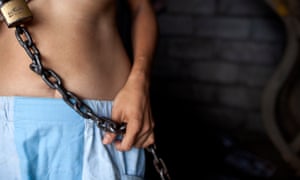
Indonesia is stepping up efforts to protect people with mental health conditions by affording national agencies new powers to monitor and close down institutions found to be abusing patients.
The country’s human rights commission and its witness and victim protection unit are among the agencies empowered to monitor facilities to check they don’t contravene a 1977 government ban on “pasung” – shackling or detaining patients in confined spaces.
Under the new agreement, which was made public in early September, agencies will have a mandate to visit places of detention, such as faith healing centres and private and state social care and mental health institutions, on a regular basis. They will have the authority to shut down or sanction facilities that use shackling.
Widespread stigma and insufficient support mean thousands of people with psychological disabilities suffer abuses including physical and sexual violence, involuntary treatment such as electroshock therapy, seclusion, restraint and forced contraception, according to Human Rights Watch (HRW).
A 2016 report by the organisation highlighted the alleged abuses suffered by people with mental health conditions. Following publication, the government launched a programme to raise awareness about mental health issues and provide training to health workers. The scheme involved health workers visiting people’s homes to collect information about mental health conditions in families and to check they were receiving adequate services. According to HRW, the programme made it “easier for community health workers to detect cases of shackling and facilitate the release of shackled people”.
Kriti Sharma, an HRW researcher who has been studying shackling in Indonesia for five years, welcomed the new agreement.
“Shackling people with mental health conditions is illegal in Indonesia and yet it remains a widespread and brutal practice,” she said. “People spend years locked up in chains, wooden stocks or goat sheds because families don’t know what else to do.
“The Indonesian government has made a serious effort to tackle the practice of shackling since we published our report in 2016. But with little oversight, thousands of people remain in chains or locked up in institutions across the country.”
Sharma said the new agreement was important because “it provides for regular and independent monitoring of government and private institutions. If they find any abuse, the authorities should take action, and ultimately they should support people with mental health conditions to live independently in the community”.
The 2016 study highlighted serious shortcomings in mental healthcare, with only 600–800 psychiatrists providing services for a population of more than 250 million. More than 57,000 people in Indonesia have suffered from pasung at least once in their lives, the report said.
It also raised alarms about the level of hygiene in overcrowded institutions, where researchers said “people are routinely forced to sleep, eat, urinate and defecate in the same space”.
One woman experiencing mental health issues told HRW she was chained three times in Yayasan Galuh rehabilitation centre in Bekasi, West Java. “I got hit by the staff and was handcuffed for one whole week,” she said. “I couldn’t even go to the toilet – I had to pee there, in my clothes.”
Thanks to awareness campaigns, including work by local groups such as the Indonesian mental health association, the number of patients shackled or locked up in confined spaces has fallen from 18,800 in 2016 to roughly 12,800 in July 2018, according to government data cited by HRW.
A woman, 52, confined to her room for five years in Cijeruk, Bogor, was eventually rescued by health workers after a home visit. “She would sleep on the floor; she couldn’t walk because her muscles had stopped working,” her sister said. “We gave her a bucket to urinate and defecate in. It was very smelly. It made me very sad.”
Forcibly admitting a person with mental health problems to an institution is still relatively easy in Indonesia. People with psychological disabilities are often detained in faith healing centres or mental health facilities where “people are shackled, abused, and forced to take alternative ‘treatments’ such as herbal concoctions, vigorous massages by traditional healers, and forced listening to Quranic recitations”, according to HRW.
A woman in her mid-30s, who was chained at home, told researchers that she was tricked by her family to go to Yayasan Galuh rehabilitation center.
“They told me my mother had passed away and they were taking me to her funeral. Instead they brought me here,” she said.
[“source=theguardian”]







